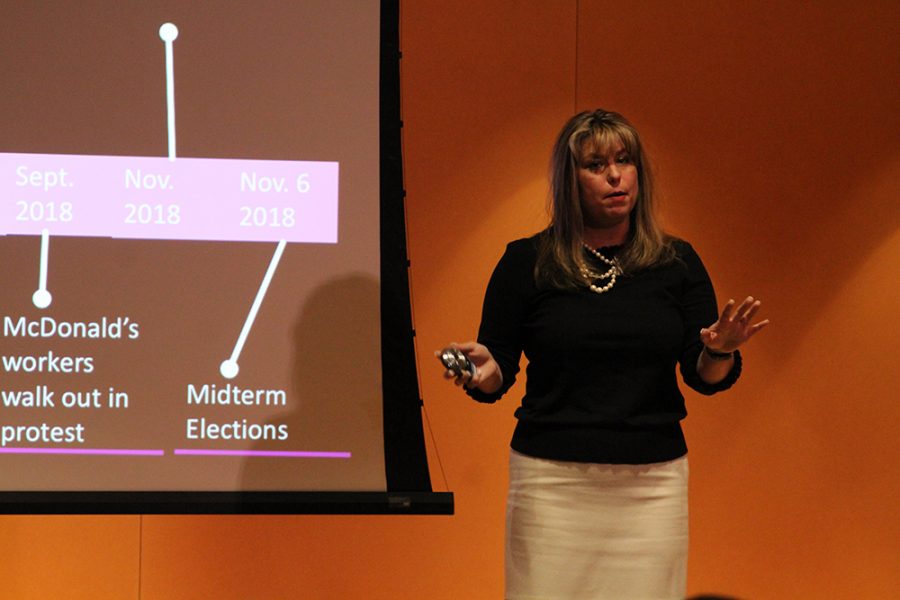Alumna talks advocating for women amid #MeToo era
Thalia Rouley | The Daily Eastern News
Eastern alumna Julie Proscia gives her presentation, “The #MeToo Movement: Transition From Outrage to Action”, for Women’s History Awareness Month in the Doudna Lecture Hall on Tuesday night. The presentation was to bring awareness about how sexual assault and sexual abuse victims today are reclaiming and stating their power as women.
March 6, 2019
Eastern kicked off Women’s History and Awareness Month (WHAM) with “The #MeToo Movement: Transition From Outrage to Action” with keynote speaker Julie Proscia at the Doudna Lecture Hall Tuesday night.
“The ‘Me Too’ movement means taking steps to become an advocate for ourselves,” Julie Proscia said. “It’s taking actions to advocate for ourselves individually and women collectively.”
Proscia’s presentation consisted of a timeline including significant #MeToo events that have happened between 1991 through 2018.
Proscia said women need to stand up for themselves or need to start “being in the room,” meaning women need to put themselves into places where women are not necessarily expected to be.
“I think being in the room is important but also getting your voice heard in whatever way that is,” Proscia said. “We can get in the room in different ways.”
Senior psychology major Laura Rolfes said any women can tap into the #MeToo movement.
“I thought it was really cool to hear from somebody who is ‘in the room’ as she would say,” Rolfes said. “It’s not a lesson about how to overcome but how fighting to fix things that are already existing.”
Sophomore public relations major Nayeli Vazquez said she loved the presentation.
“The #MeToo movement is important to me because I’m a girl. We should all stick up for each other,” Vazquez said. “The only way things are going to change is if people stick together.”
The #MeToo movement officially started in 2006 but became bigger last year when Alyssa Milano tweeted about it.
“#MeToo is great because it did take it from an individual level and brought it to a large scale in which we all can identify with our individual stories and how it’s collectively not okay,” Rolfes said.
Vazquez said she thinks people need to start standing up for themselves more.
“I think girls need to stand up for themselves more at EIU,” Vazquez said. “There’s a whole bunch of ways guys can help out girls at EIU too.”
The #MeToo movement is mainly focused around girls who have been sexually harassed or assaulted, but men can make a difference as well.
“I think a lot of times men will hear people talking and they’ll just let it go, and we’ll just let it go too,” Proscia said. “But in particular we all need to speak up and voice opposition when people are making jokes and banter.”
Rolfes agreed with what Proscia had to say.
“We need people to understand where their privilege is or how that privilege is harming women, and that’s not OK,” Rolfes said.
Rolfes and Vazquez took a lot away from the presentation tonight.
“I think coming to events like this can help the future of this movement,” Rolfes said. “Getting in the room is important.”
“It was cool getting to meet her and get her card,” Vazquez said. “She’s someone I would look up to.”
Proscia said she wants the audience to realize they need to get actively involved.
“It’s not somebody else’s fight,” Proscia said. “It has to be their fight because if we rely on somebody else to do it only maybe is it going to happen.”
Hannah Sieg can be reached at 581-2812 or [email protected].



















































